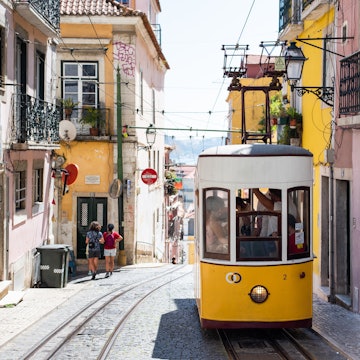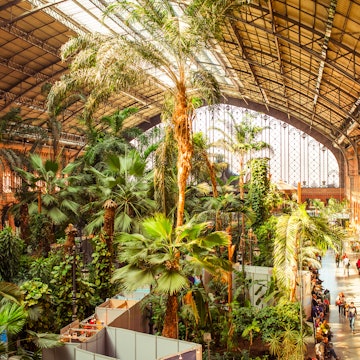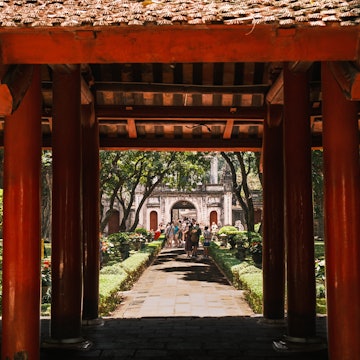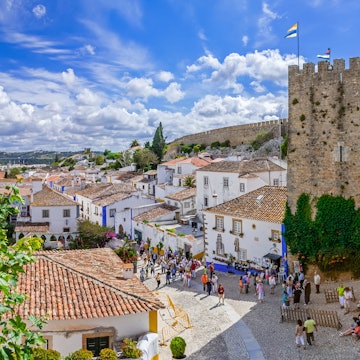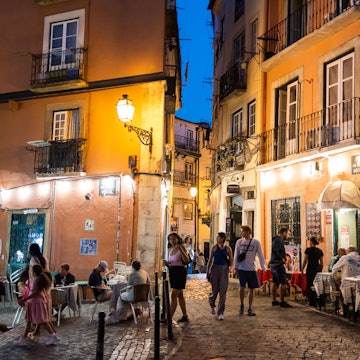

There's a strong sense of community among Lisbon's freelancers © Sean Pavone / Shutterstock
Lisbon has its eye on becoming Silicon Valley on the Tagus River, and Google is just one tech big hitter to set up a base here, ensuring ready opportunities for developers. But what else makes it so good for digital nomads and remote workers?
Editor's note: during COVID-19 there are restrictions on travel. Check the latest guidance before departure, and always follow local health advice.
Why should digital nomads choose Lisbon?
With the big city location, the Portuguese capital appeals to digital nomads who come to work as much as play, though there’s no shortage of great, affordable places to eat, drink and party for when the mood takes you.
What nomads love best about Lisbon is the sense of community among freelancers. The Lisbon Digital Nomads Facebook group has nearly 19,000 members, and arranges weekly meetups for networking, socializing, eating, and just unwinding with a cold cerveja or a glass of ginjinha (cherry liqueur). Many co-working spaces have co-living accommodations and almost all arrange meetups.
Then there’s the lifestyle. Despite its technological aspirations, Lisbon is one of Europe’s most human-friendly capital cities, sprawling in a tangle of cobblestone streets over seven historic hills, and dotted with grand Pombaline architecture. Relaxed drinking laws mean that sleepy backstreets come alive at nightfall and fill with activity till the early morning hours, and by day, cafes with fast wi-fi serve dainty cups of bica (espresso coffee) to Lisbonites on the go.

Best co-working spaces
Space to think is the big appeal of Heden, tucked into a busy square in Graça. Co-working spaces popular with devs share a site with artists’ studios and a venue for talks and events, ensuring lots of creative crossover. Some co-working spaces can feel a bit like an Ikea showroom, but Workhub Lisboa has a gorgeous location in the old Abel Pereira da Fonseca wine warehouse, in the up-and coming neighborhood of Poco do Bispo. The internet connection is lightning fast and there’s a casual lounge space, or desks and private offices rented by the month.
Internet speeds
Wi-fi is everywhere in Lisbon, including in most cafes, and downloads speeds of 25 Mbps or more are standard. Mobile 4G coverage is widespread across the city, and 5G is just around the corner, thanks to a big push by Vodafone.
Living arrangements
Hotels and guesthouses are everywhere but most digital nomads opt for rented apartments and rooms or co-living accommodations – conveniently attached to many of the city’s co-working spaces. Many find accommodations through Airbnb, but with the demand from tourists, it’s often easier to find a room through people you meet via digital nomad meetups or through Facebook groups. Get around by city bus and tram and eat inexpensively at local tascas – family-run restaurants serving cheap pratos do dia (daily specials) that change through the week depending on what the owners have in the kitchen.
Networking
Lisbon networking group you could join include Digital Nomads PT, Lisbon Digital Nomads and Lisbon Digital Nomads' public Facebook group.

Things to do when you're not working
Spend all night (and possibly some of the next morning) at a street party in Cais do Sodré or Bairro Alto – the Feast of St Anthony (Sardine Festival) on June 12 is one of Portugal’s biggest public shindigs.
Escape the city crush to surf, splash or sunbathe at Costa de Caparica, Nazaré or Peniche, all within an hour and a half of downtown and accessible by local bus.
Soak up some chlorophyll in the green bower of Parque Florestal de Monsanto, a replanted forest sprawling along the city fringes, crisscrossed by hiking trails and dotted with lookouts with grand city views.
Pros and cons
As with every travel experience in any destination, there are good bits and bad. Here's a breakdown of things to consider:
Lisbon is great for:
★ Sense of community
★ Tech opportunities
★ Cheap, tasty food
★ Warm weather
★ High quality of life
Lisbon is not so great for:
★ Peace at night
★ Lack of crowding
★ Accommodation prices
★ Variety
★ Affordable flights to other countries
Practicalities
Climate: Spring (March–May) and autumn (September–August) are optimum, with balmy temperatures and quieter streets; the incendiary summer (June–September) sees Lisbon mobbed by tourists. Many nomads relocate during the cold and quiet winter.
Getting there: Lisbon Portela Airport, Lisbon.
Getting around: Trains and buses connect with Lisbon from across Europe.
Living costs: From €1000 per month.
LGBT-friendly: Yes.
Pre-departure reading
Lonely Planet’s Portugal and Pocket Lisbon guidebooks
Night Train to Lisbon by Pascal Mercier
The Year of the Death of Ricardo Reis by José Saramago
A Small Death in Lisbon by Robert Wilson
This extract is from Lonely Planet's Digital Nomad Handbook, available now at Lonely Planet Shop.
You might also like:
Top 12 free things to do in Lisbon
The 10 best countries for working remotely, according to Lonely Planet writers
Everything you need to consider before becoming a digital nomad
Take your Portugal trip with Lonely Planet Journeys
Time to book that trip to Portugal
Lonely Planet Journeys takes you there with fully customizable trips to top destinations–all crafted by our local experts.

















